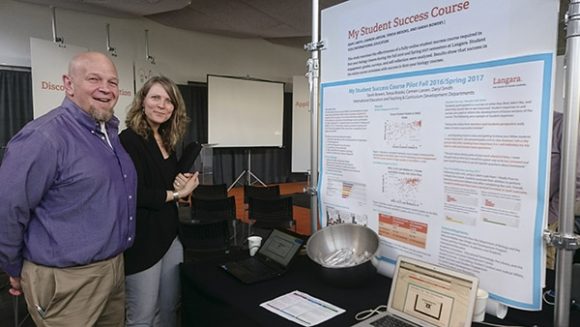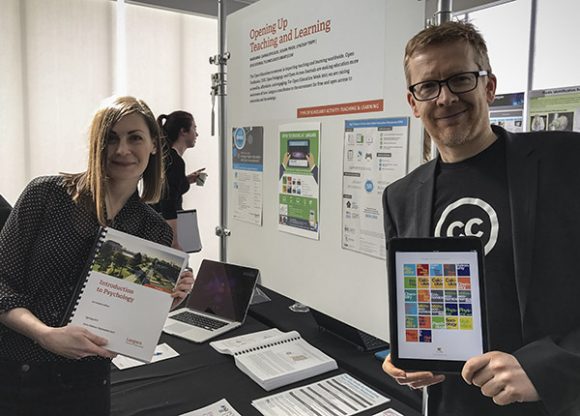Scholarship Café attendees enjoyed seeing all the faculty and students’ work represented — very impressive! This year’s venue of the T-Gallery with professionally printed posters (thank you C&M) provided a polished and dynamic event. Read about the My Student Success Course, Opening up Teaching and Learning, and Langara Makerspace.
My Student Success Course Pilot
The My Student Success Course (MSSC) was developed as a stand-alone course delivered entirely online to prepare student for academic life at Langara. Two versions have been piloted. In fall 2016, students in all sections of two biology courses participated (n=320). In spring 2017, a revised version was piloted in biology and WMDD (n=575). In both pilots, students received a maximum of 2.5% of their final grade for their course from completion of unit quizzes in the MSSC.

Daryl Smith, Carmen Larsen, and Sarah Bowers presented the course and initial pilot findings at the Café . Their poster outlines the six initial units developed, the course design, plug-ins for maximizing visual interest, and reflections on the initial pilot phases. Attendees were also able to try out the course within D2L.
“One of the students who stopped by the MSSC booth took the course in Fall 2016 and provided some direct feedback on the course, which will help make the course even better.” – Carmen
Opening up Teaching and Learning
The timing was appropriate as the Scholarship Cafe event coincided with Open Education Week and afforded Julian Prior (EdTech) and Lindsay Tripp (Library) to report

out on the impact of Langara’s grassroots participation in the open textbook initiative and raise awareness for other faculty and students.
Scholarly research into the impact of Open Textbooks on the student experience is still at a relatively early stage, particularly in a Canadian context. To address this Lindsay and Julian plan to carry out a small-scale research project in the summer focusing on what Open Textbook adoption might mean at Langara for international student recruitment, retention, success and engagement.
Talking to students and instructors, they highlighted open textbooks’ benefits such as the ability to remix and reuse content and involving students as co-creators. During the Scholarship Café, Julian was excited to hear feedback from students.
“A Chemistry student talked about how enthused he was about the idea of using Open Textbooks (even though his course hasn’t adopted one). He felt there needed to be more awareness raising amongst students which could lead to more Open Textbook adoptions across a wider range of courses. This got us thinking about how we could involve our Open Langara student reps in this process.” – Julian
Langara Makerspace
Philip Robbins, the Makerspace Coordinator led the Scholarship Café event as keynote speaker. Philip provided context on the various types of makerspaces while stressing how academic makerspaces address the ethics of, and critical content within, new object creation.
Langara’s makerspace expands experiential learning opportunities, encourages interdisciplinary sharing of knowledge, promotes peer learning, and enhances students’ skillsets outside the traditional classroom. The Makerspace is a space to nurture the creativity of students, faculty, and staff, a space where people can gather, think, create, and learn.
Although the official opening will be held in fall 2017, the makerspace (A268) has already held an open house and the Reconciliation Silversmithing Class. Unlike industrial or community makerspaces, Langara’s Makerspace – an extension of the classroom – will focus on the deeper, critical understandings and skillsets built through the co-creation of meaningful objects. There will be opportunities for curricular access, focused workshops and drop-in work, all with the priority of expanding learning.
The makerspace is currently equipped with 3D printers, a CNC router, a laser cutter, scanners, sewing machines and a selection of hand tools.
